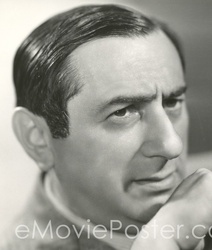ERNST LUBITSCH

Ernst Lubitsch was born in Berlin, Germany in 1892, to Russian/Jewish immigrants, and he was expected to become a tailor like his father. If he had done so, the movies would have been robbed of one of its greatest directors ever, and his sophisticated romantic comedies were so distinctive (and wonderful) that they were described as having "the Lubitsch touch"! But when Lubitsch first decided to not be a tailor, in 1911, it was to become a stage actor. A year later he made his first movie, and he was in 23 of them between 1914 and 1916 alone! But in 1914, he had also begun to direct (often directing himself), and in 1920, after having appeared in 36 movies, and directing 38, he decided to quit acting and concentrate on directing. His first big successes were historical melodramas, Madame Du Barry, Anna Boleyn, and Carmen. American star Mary Pickford saw his work and hired him to direct her in the U.S. in Rosita. They clashed during the filming, but he stayed in the U.S. and he signed a deal to make six pictures for Warner Bros, and he was given "final cut" privileges, something rarely ever given, and cherished by directors! It was here that Lubitsch first made his first trademark sophisticated romantic comedies. But those films were not big successes, and Warners sold his contract to MGM. This was the time of the beginning of sound movies, and Lubitsh added both sound and music to his comedies, with great success. In 1932, he directed Trouble in Paradise for Paramount, and it was written by Samson Raphaelson, and starred Herbert Marshall, Kay Francis, and Miriam Hopkins. Many people, myself included, consider this the best romantic comedy ever made, and if you have never seen it, I envy you the joy you will have once you do! In 1935, Paramount was so taken with Lubitsch (and his success) that he became head of the studio, the only director ever to both head a major studio and still direct movies. But he could not do both, and he was fired after a year. In 1939, Lubitsch signed a contract with MGM and made Ninotchka (a comedy with the ultra-serious actress Greta Garbo, promoted as "Garbo Laughs") and The Shop Around the Corner, which again paired Lubitsch with writer Samson Raphaelson. The movie is set in Budapest, and it has two co-workers who bicker by day and write love letters to each other by night, and it is a marvelous movie that also simply must be seen (and please try to see it before seeing either of the re-makes, In the Good Old Summertime, or You've Got Mail). In his later life, Lubitsch was in poor health and he suffered a series of heart attacks, and one in 1947 proved fatal. He was 55 years old. The story (perhaps apocryphal) goes that when legendary director Billy Wilder left his funeral he said, "No more Lubitsch" to which equally legendary director William Wyler replied, "Worse than that. No more Lubitsch pictures."! Some of his other movies include: Love Parade (nominated for the Best Director Academy Award for this film), The Patriot (nominated for the Best Director Academy Award for this film), and The Merry Widow.

